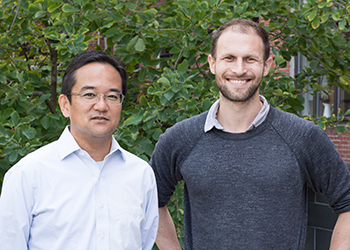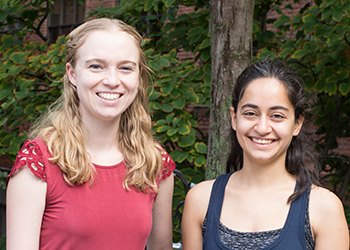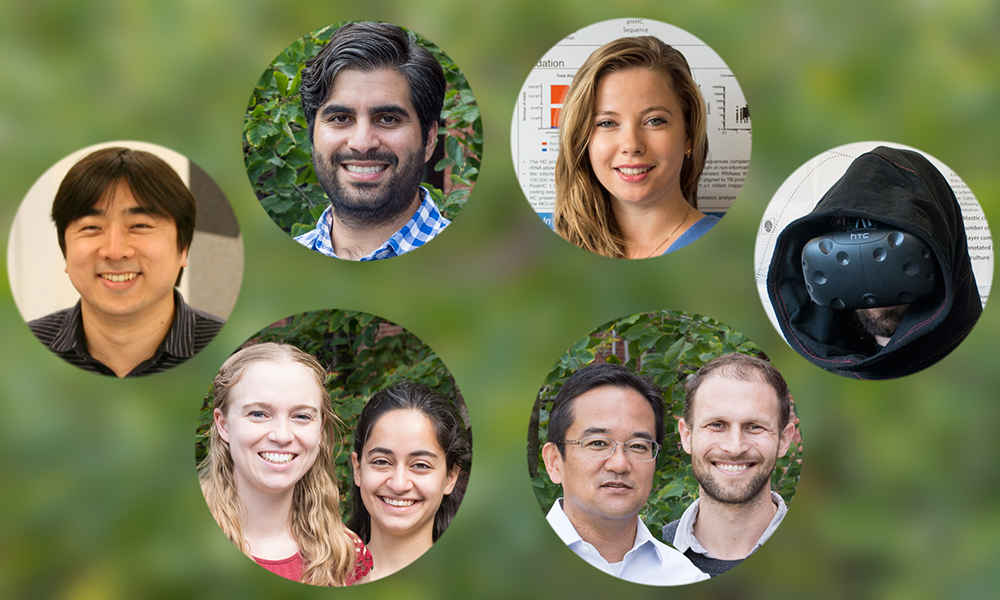This year, MCB community members gathered at Nantucket Beach Resort in Hull, MA for the annual MCB Department retreat. Some arrived by bus, others by car or bike, and still others arrived in kayaks. What followed were two days of exchanging ideas, sharing research, and getting to know each other.
Each year, the retreat culminates with an awards ceremony honoring individuals in the MCB community for their service and outstanding science. The awardees are:

Matthew Meselson and HyungGoo Kim
The Meselson Prize
For postdoc HyungGoo Kim of the Uchida Lab, receiving the 2018 Meselson Prize for “Most Beautiful Experiment” came as a “big surprise.”
“My expectations were not high because there are so many interesting research [projects] going on here,” Kim says. But when the presenter called his name, he was thrilled. “Getting a prize in front of many people that I know is definitely a more emotional experience than receiving an acceptance email about a submitted manuscript [while] sitting in the office,” he says.
Kim’s award-winning experiment used virtual reality technology to investigate one of the most fundamental emotional states in the mammalian brain–surprise itself. Specifically, the study focused on surprise about future rewards.
Previous research has found that as animals approach a location where they receive rewards, dopamine levels in their brain slowly ramp up. (Kim’s go-to example of an animal experiencing this is a hungry person walking toward the food truck outside MCB.) Some researchers have interpreted the dopamine ramp-up as evidence that the animal is anticipating the reward and therefore not surprised by it.
To find out whether that hypothesis holds true, Kim used a technique called virtual teleportation to surprise the mice. “I teleported the animals in space using virtual reality,” Kim explains. In these experiments, he measured how dopamine activity changes in a reward-processing center of the brain. In some trials, the mice were virtually teleported closer to an anticipated reward, allowing Kim to discern whether the dopamine ramp-up is part of the surprise response.
“The two models [dopamine ramp-up as “expecting reward” signal and dopamine ramp-up as “surprise” signal] predict radically different patterns of responses, and the results support that the dopamine ramping is a surprise signal,” he says.
The judges’ citation noted, “Dr. Kim’s work required a sophisticated and non-trivial thought-model…which was then tested in a series of elegant experiments.”
Kim is honored to receive an award that links his work to Professor Meselson’s 1958 experiment that revealed DNA’s replication mechanism and the tradition of elegant experiments in biology. “I’d like to thank the people who developed techniques [that enabled the experiment]–fiber photometry and virtual reality,” Kim says. “Finally, I’d like to thank my m81 mouse that showed a very clear teleport response in the first attempt.”

Nao Uchida (l) and Sam Gershman
The Björkman-Strominger-Wiley Prize for Collaboration
The winners are the Uchida Lab, headed by MCB Professor Nao Uchida, and the Gershman Lab, lead by Professor Sam Gershman of the Department of Psychology and Center for Brain Science.
Harvard MCB faculty say that the Uchida-Gershman collaboration is highly meritorious on three counts:
“First, the science represents a major contribution to researchers’ understanding of risk/reward behavior. In three compelling papers, the authors show that dopamine activity distinguishes between whether a reward is delivered with certainty or only a high proportion of the time and attributed the response to uncertainty, in which the animal must make inferences about the environment in the medial prefrontal cortex.
“Second, the collaboration involves an impressive synergy between an experimentalist (Uchida) and a theoretician (Gershman).
“Third, and as in the case of the original Björkman-Wiley-Strominger collaboration, this collaboration is anchored by a graduate student–Clara Starkweather–who helped drive both the theoretical and experimental aspects of the work.”
Joint postdoc Benedicte Babayan, who split her time between the two labs, is also key to the collaboration.
The prize is named after MCB faculty members Jack Strominger and Don C. Wiley (1944-2001) and then-graduate-student Pamela Björkman, who is now a faculty member at Caltech. It recognizes innovative Harvard collaborations that advance scientific knowledge.

Rich Losick and Adnan Syed
Doty-Losick Prize for Exceptional Service
The Doty-Losick Prize for Exceptional Service recognizes individuals who go above and beyond in serving the MCB community. It is named after current MCB professor Richard Losick and founding MCB professor Paul Doty (1920-2011). This year’s Doty-Losick Prize went to postdoc Adnan Syed of the Losick Lab.
In addition to his postdoctoral work with Professor Losick, Syed also leads the Microbial Sciences Initiative, serves as current president of the FAS Postdoctoral Association, and co-organizes the GEARS [Gene Expression and RNA Series] seminar series.
He was nominated by over two dozen signatories among four different letters. One of the letters noted, “His service to the MSI had indeed been truly exceptional and selfless!”
“I feel incredibly honored to win the Doty-Losick Prize,” Syed says. He didn’t expect to receive any accolades at the retreat ceremony and was mentally rehearsing a talk when Professor Craig Hunter called his name. “It was a complete shock to me,” he adds. ”It’s also surreal to win a prize named after your mentor!”
Syed is the first postdoc to lead Harvard’s Microbial Sciences Initiative (MSI). His responsibilities include coordinating and executing all MSI activities, but he’s quick to acknowledge that he has a great deal of help. “[Balskus Lab postdoc] Monica McCallum, [Kolter Lab Research Fellow] Scott Chimileski, and I have organized the monthly seminar series, weekly chalk talks and yearly symposium. We also have graduate students [Cara Weisman of the Murray Lab and Jenny Zheng of the Garner Lab] helping by organizing the summer journal club,” he says. Graduate students Denise Sirias of the Gibbs Lab and postdoc Thiago Santos of the Kahne Lab also contribute by leading a microscopy class, Syed adds. The newest addition to the roster of MSI activities is microbial foods club, where participants grow foods like kimchi and kombucha.
Syed was also instrumental in founding an association of postdoctoral fellows for the entire Faculty of Arts and Sciences (FASPDA) in 2016. He went on to serve as president of the FASPDA for 2 years.
He also co-organizes the Gene Expression and RNA Series (GEARS), a monthly seminar highlighting the latest research from across the Boston biological research community.
“Great ideas aren’t formed if you hide in your lab all the time, but great ideas come through discussions with the community, be that during a seminar, over a coffee, or while brewing beer,” he says. “None of these organizations would even exist if it were not for all the other organizers in the community and a very receptive and helpful administration.”

Stephania Irwin (l) and Kalki Kukreja
Ernest Peralta Fund Award
Each year, the MCB faculty nominate graduate students who have written outstanding dissertation proposals and performed well on qualifying exams for the Ernie Peralta Award, which is named after MCB professor Ernest Peralta (1959-1999).
The awards committee remarked that this year’s nominees made it a real challenge to select a single highly deserving winner, and, for the first time ever, decided to name two Peralta Award Winners:
Stephania Irwin of the Balskus Lab and Kalki Kukreja of the Klein Lab.
Irwin’s proposal centered on metabolism in the human gut microbiome. She plans to investigate how gut microbes use and modify a compound called taurine and how these biochemical processes affect the broader microbial community and the host. “I became interested in the project because I think that understanding the role that microbial transformations play for human health and nutrition was previously often overlooked, or looked at primarily from a correlative perspective,” she says.
Faculty said that despite the breadth of Irwin’s proposal, she very quickly convinced the committee that she had ample knowledge of the techniques involved. “We therefore quickly turned our attention and questions to a bigger picture discussion of the proposal,” one committee member says. ”Stephania ably handled these questions, demonstrating that she is nimble, and quick on her feet to adjust her ideas based on new information…We were easily persuaded.”
While Irwin’s focus is on the microbiome, Kukreja is interested in developmental biology and embryos’ ability to coordinate cellular processes. “When embryonic cells develop into a full organism, they must achieve two goals: they must divide to generate all cells of the body, and they must also become specialized into different cell types,” Kukreja explains. “These two phenomena – division and differentiation – need to be coupled to correctly pattern the organism. My project aims at understand this coupling between cell cycle and cell fate.”
The committee described Kukreja’s proposal as “clear, concise, and admirably balanced ambition with feasibility.” But they were even more impressed by her oral defense. “She gave an extremely clear summary of her work and then answered–calmly, clearly, and elegantly–every single question that was thrown at her,” a committee member says. The range of questions extended from details about the regulation of the cell division cycle and historical approaches to the concepts of differentiation and determination to the difficulties of interrogating noisy and extremely high-dimensional data.
Both Peralta Award winners say they are very flattered and honored to receive such an accolade from the faculty.
“This was one of the first times I felt ownership of my project and I was able to help shape the future questions that I think are the most interesting,” Irwin says. Her advice to younger grad students would be to read widely and brainstorm early. “Continually reading the literature as you work to prepare your proposal and presentation is essential,” she says. “You start to make connections and ask questions that you never would have otherwise without really exploring the literature to this depth.”
Kukreja agrees. “Qualifying exam is not just an exam, it is an experience,” she says. “You go over phases of ups and downs, excitement and disappointment, confidence and self-doubt–stemming out of all the thinking process that is involved in its preparation. You think about your science, about the history of the project, its future, and the present which you propose to make in your PhD…Winning the confidence of my committee members has made me pumped up about my thesis even more, and I am excited to pursue it for the next few years.”
Best Poster
The retreat also featured a poster session, where graduate students and postdocs shared their recent experiments. Faculty chose two outstanding posters as the best of the session.

Graduate student Leo Blondel of the Extavour Lab took first place with his poster on “Visualizing Embryo Development in Virtual Reality”.

Second place in the poster competition went to graduate student Viktoria “Vika” Betin of the Hung Lab at the Broad Institute for her work on “Characterizing transcriptional dynamics of Mycobacterium tuberculosis infection with dual RNAseq.”
“Ensuring our work is accessible is one of the most important skills we can learn as scientists. It allows us to get input from people in different specialties and helps us demonstrate the importance of our work,” Betin says. “It feels great to be recognized for all the hard work that my collaborators and I put into this project.”


